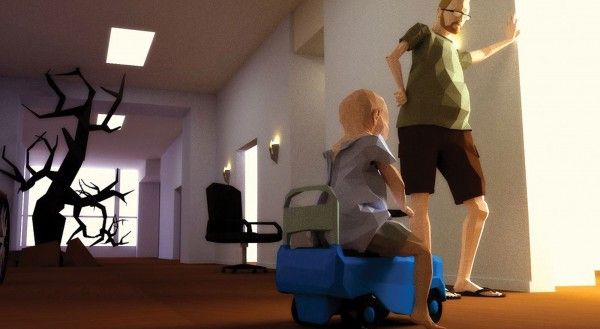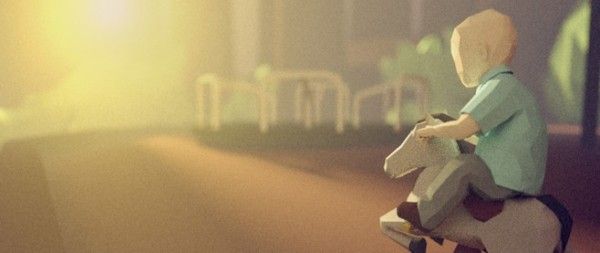A deeply personal if somewhat one-note documentary, Thank You For Playing traumatically details the process of art crafted through despair, of living under the shadow of inevitable loss and how people cope with such tragedy. Which is to say – it’s a tough sit, deliberately so, yet the end result feels less affecting than perhaps it should.
Ryan Green’s four-year-old son, Joel, is diagnosed with terminal cancer. The prognosis – Joel has less than a year to live. To cope with the news, Ryan begins to develop a video game chronicling his experiences caring for such an ill child. The documentary works best when focusing on how the art Ryan creates mirrors his own personal life. Simple moments like rocking a child to sleep or pushing him on a swing or brushing the hair off his face become reenacted in the game, in effect immortalized, showcasing just how important the minutiae is in the larger picture. Ryan’s family – his wife Amy and their two other children – also become a part of the videogame, she offering advice on its script and the children becoming voices in the game. The difference between Ryan’s home life and the fictional world he’s created become deliberately muddled. Much of the documentary focuses on how Ryan will end the game – should his son die within the confines of this fictional domain? Can Ryan bring himself to end the game in such tragic fashion? Is it somehow less truthful if the end of the game doesn’t reflect reality?
Making the video game (That Dragon Cancer) becomes far more than simply an escape for Ryan. It allows the working-class man an outlet to fulfill his creative ambitions. The dichotomy between art and the cost of inspiration lingers over much of the doc. Ryan is quick to admit that he never really had anything to say before Joel was diagnosed; but now that he does (have something to say that is) – was it even worth it?
Most of the footage in the documentary seems to have been shot by Ryan and Amy themselves. We’re with the family as Joel is taken between hospitals for treatment. We’re there in the bedroom when Joel falls asleep in Ryan’s arms. Even the interviews feel closer than normal, the camera right up in the subject’s faces, their heads cutting in and out of frame. Thank You For Playing feels so deeply personal and intimate that it strangely enough has the opposite effect. I found myself becoming more and more detached from the picture almost as if I shouldn’t be there or maybe more truthfully – that I didn’t want to. These moments between father and dying son, between grieving wife and husband feel almost too personal to view. At times I felt like a stranger watching some poor family’s home videos. To be fair the documentary seems aware of this fact, often meta-narratively questioning itself. Amy and Ryan will turn to the camera and ponder why they’re still allowing these moments to be shot, if they even should and what point the documentary actually serves.
Ultimately the documentary is the point in and of itself. Thank You For Playing and That Dragon Cancer both become a means to preserve this young boy’s life even after he’s gone. In the most touching scene, Ryan worries not if his son will die but if one day he’ll forget about him all together – what he looks like, who he was, what he meant, the existential fear – not death but to be completely forgotten afterwards. In this way – the video game and documentary serve as reminders of who Joel was, commemorating a boy who never really had the chance to live. It’s a noble and heartfelt tribute to a lost family member; but to the stranger watching, or at least to this stranger watching, it felt suffocating – this family’s despair so singular and omnipresent that it dulls rather than enlightens.
There are still strong bits here and there to recommend. A sequence wherein Ryan tests his video game at a convention injects some much need levity into the picture, juxtaposing all the prevalent first person shooters against Ryan’s far more emotionally draining game. It’s both touching and humorous to watch a young gamer, expecting to shoot up some zombies or monsters or combat enemies, reduced to tears caring for a sick animated boy. The glimpses we get of That Dragon Cancer appear surprisingly surreal – and some of the best moments focus on Ryan developing the look and feel of this virtual world reflective of his own life.
The documentary itself though falls under the weight of its own despair, repeating this same solemn note, succeeding in honoring a boy’s memory but unfortunately failing to move.
Rating: C+



